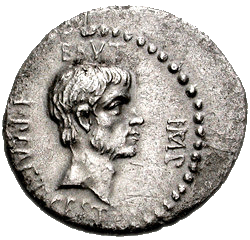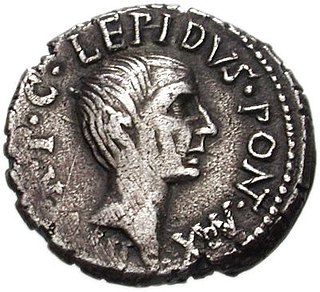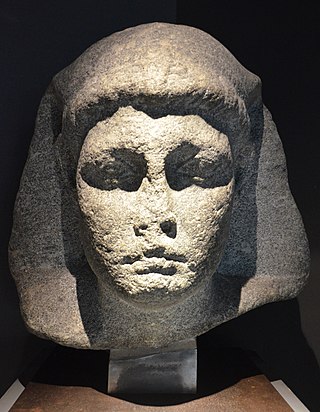
Marcus Antonius, commonly known in English as Mark Antony, was a Roman politician and general who played a critical role in the transformation of the Roman Republic from a constitutional republic into the autocratic Roman Empire.

The 1st century BC, also known as the last century BC and the last century BCE, started on the first day of 100 BC and ended on the last day of 1 BC. The AD/BC notation does not use a year zero; however, astronomical year numbering does use a zero, as well as a minus sign, so "2 BC" is equal to "year –1". 1st century AD follows.
This article concerns the period 39 BC – 30 BC.
Year 43 BC was either a common year starting on Sunday, Monday or Tuesday or a leap year starting on Sunday or Monday of the Julian calendar and a common year starting on Monday of the Proleptic Julian calendar. At the time, it was known as the Year of the Consulship of Pansa and Hirtius. The denomination 43 BC for this year has been used since the early medieval period, when the Anno Domini calendar era became the prevalent method in Europe for naming years.

This article concerns the period 49 BC – 40 BC.

This article concerns the period 59 BC – 50 BC.
80s BC is the time period from 89 BC – 80 BC.

Marcus Junius Brutus was a Roman politician, orator, and the most famous of the assassins of Julius Caesar. After being adopted by a relative, he used the name Quintus Servilius Caepio Brutus, which was retained as his legal name. He is often referred to simply as Brutus.
Year 30 BC was either a common year starting on Wednesday, Thursday or Friday or a leap year starting on Thursday of the Julian calendar and a common year starting on Wednesday of the Proleptic Julian calendar. At the time, it was known as the Year of the Consulship of Octavian and Crassus. The denomination 30 BC for this year has been used since the early medieval period, when the Anno Domini calendar era became the prevalent method in Europe for naming years.

Marcus Aemilius Lepidus was a Roman general and statesman who formed the Second Triumvirate alongside Octavian and Mark Antony during the final years of the Roman Republic. Lepidus had previously been a close ally of Julius Caesar. He was also the last pontifex maximus before the Roman Empire, and (presumably) the last interrex and magister equitum to hold military command.

Ptolemy XV Caesar, nicknamed Caesarion, was the last pharaoh of Ptolemaic Egypt, reigning with his mother Cleopatra VII from 2 September 44 BC until her death by 12 August 30 BC, then as sole ruler until his death was ordered by Octavian.
Decimus Junius Brutus Albinus was a Roman general and politician of the late republican period and one of the leading instigators of Julius Caesar's assassination. He had previously been an important supporter of Caesar in the Gallic Wars and in the civil war against Pompey. Decimus Brutus is often confused with his distant cousin and fellow conspirator, Marcus Junius Brutus.

Lucius Munatius Plancus was a Roman senator, consul in 42 BC, and censor in 22 BC with Paullus Aemilius Lepidus. He is one of the classic historical examples of men who have managed to survive very dangerous circumstances by constantly shifting their allegiances. Beginning his career under Julius Caesar, he allied with his assassin Decimus Junius Brutus in 44 BC, then with the Second Triumvirate in 43 BC, joining Mark Antony in 40 BC, and deserting him for Octavian in 32 BC. He also founded the cities of Augusta Raurica and Lugdunum. His tomb is still visible at Gaeta.

The Battle of Forum Gallorum was fought on 14 April 43 BC between the forces of Mark Antony and legions loyal to the Roman Senate under the overall command of Consul Gaius Pansa, aided by his fellow consul Aulus Hirtius. The untested Caesar Octavian guarded the Senate's camp. The battle occurred on the Via Aemilia near a village in northern Italy, perhaps near modern-day Castelfranco Emilia.
Lucius Julius Caesar was a Roman politician and senator who was elected consul of the Roman Republic in 64 BC. A supporter of his cousin, the Roman dictator Gaius Julius Caesar, Lucius was a key member of the senatorial coalition which strove to avoid civil war between the Roman Senate and his nephew Marcus Antonius in the aftermath of Caesar's assassination in 44 BC.

Julius Caesar was assassinated by a group of senators on the Ides of March of 44 BC during a meeting of the Senate at the Curia of Pompey of the Theatre of Pompey in Rome where the senators stabbed Caesar 23 times. They claimed to be acting over fears that Caesar's unprecedented concentration of power during his dictatorship was undermining the Roman Republic. At least 60 to 70 senators were party to the conspiracy, led by Marcus Junius Brutus, Gaius Cassius Longinus, and Decimus Junius Brutus Albinus. Despite the death of Caesar, the conspirators were unable to restore the institutions of the Republic. The ramifications of the assassination led to his martyrdom, the Liberators' civil war and ultimately to the Principate period of the Roman Empire.

The Philippics are a series of 14 speeches composed by Cicero in 44 and 43 BC, condemning Mark Antony. Cicero likened these speeches to those of Demosthenes against Philip II of Macedon; both Demosthenes' and Cicero's speeches became known as Philippics. Cicero's Second Philippic is styled after Demosthenes' On the Crown.

The military campaigns of Julius Caesar were a series of wars that reshaped the political landscape of the Roman Republic, expanded its territories, and ultimately paved the way for the transition from republic to empire. The wars constituted both the Gallic Wars and Caesar's civil war.
The War of Mutina was a civil war between the Roman Senate and Mark Antony in Northern Italy. It was the first civil war after the assassination of Julius Caesar. The main issue of the war were attempts by the Senate to resist Antony's forceful assumption of the strategically important provinces of Transalpine and Cisalpine Gaul from their governors. The Senate, led by Cicero and the consuls, attempted to woo Julius Caesar's heir to fight against Antony. Octavian, however, would pursue his own agenda.












